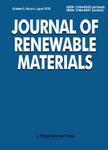Optimizing Household Wastes (Rice, Vegetables, and Fruit) as an Environmentally Friendly Electricity Generator
作者机构:Department of ChemistryFaculty of Mathematics and Natural SciencesUniversitas Negeri MalangMalang65145Indonesia Chemistry and PKWUSMAN 3 SidoarjoSidoarjo61215Indonesia
出 版 物:《Journal of Renewable Materials》 (可再生材料杂志(英文))
年 卷 期:2024年第12卷第2期
页 面:275-284页
核心收录:
学科分类:080801[工学-电机与电器] 0808[工学-电气工程] 08[工学]
基 金:Universitas Negeri Malang UM
主 题:Electrical energy fruit waste rice waste vegetable waste
摘 要:The high consumption of electricity and issues related to fossil energy have triggered an increase in energy prices and the scarcity of fossil ***,many researchers are seeking alternative energy *** potential technology,the Microbial Fuel Cell(MFC)based on rice,vegetable,and fruit wastes,can convert chemical energy into electrical *** study aims to determine the potency of rice,vegetable,and fruit waste assisted by Cu/Mg electrodes as a generator of *** method used was a laboratory experiment,including the following steps:electrode preparation,waste sample preparation,incubation of the waste samples,construction of a reactor using rice,vegetable,and fruit waste as a source of electricity,and *** tests included measuring electrical conductivity,electric current,voltage,current density,and power *** on the test results,the maximum current and voltage values for the fruit waste samples were 5.53 V and 11.5 mA,respectively,with a current density of 2.300 mA/cm^(2) and a power density of 12.719 mW/cm^(2).The results indicate the potential for a future *** next step in development involves determining the optimum conditions for utilizing of rice,vegetable,and fruit *** results of the electrical conductivity test on rice,vegetable,and fruit waste samples were 1.51,2.88,and 3.98 mS,respectively,with the highest electrical conductivity value found in the fruit waste sample.



